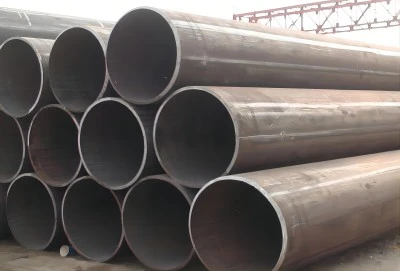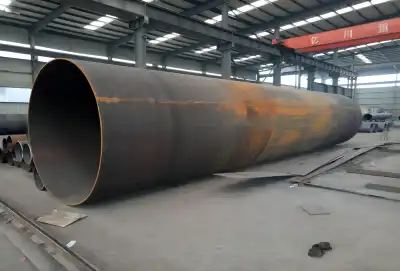In the realm of fluid transportation, efficiency and reliability are paramount. API line pipe stands out as a crucial component in achieving these goals, offering a robust solution for transporting liquids and gases across vast distances. This article delves into the intricacies of API line pipe and how it contributes to the seamless flow of fluids in various industries.
|
|
|
Durability and Strength of API Line Pipe in Harsh Conditions:
API line pipe, manufactured to stringent standards set by the American Petroleum Institute (API), exhibits exceptional durability and strength, making it ideal for use in challenging environments. These pipes are designed to withstand extreme pressures, temperatures, and corrosive substances, ensuring the safe and efficient transportation of fluids even under the most demanding conditions.
The robustness of API line pipe stems from its carefully selected materials and manufacturing processes. High-grade steel alloys are utilized to create pipes that can resist mechanical stress, thermal expansion, and chemical degradation. This resilience is particularly crucial in offshore oil and gas operations, where pipes are exposed to saltwater, high pressures, and fluctuating temperatures.
Moreover, the API line pipe's ability to maintain structural integrity in seismically active regions is noteworthy. Engineers design these pipes with flexibility and strength in mind, allowing them to withstand ground movements without compromising their functionality. This characteristic is essential for ensuring uninterrupted fluid transportation in areas prone to earthquakes or subsidence.
The durability of API line pipe also translates to longevity, reducing the need for frequent replacements and minimizing downtime. This aspect not only enhances operational efficiency but also contributes to cost-effectiveness in the long run. By investing in high-quality API line pipe, companies can ensure a reliable and enduring infrastructure for fluid transportation.
API Line Pipe Specifications for Optimal Performance:
The performance of API line pipe is intrinsically linked to its specifications, which are meticulously defined to meet the diverse needs of fluid transportation systems. These specifications cover a wide range of parameters, including diameter, wall thickness, grade, and chemical composition, each playing a crucial role in determining the pipe's capabilities and suitability for specific applications.
Diameter specifications are pivotal in determining flow capacity and pressure ratings. Larger diameters facilitate higher flow rates, while smaller diameters may be preferred for high-pressure applications or where space is limited. The choice of diameter depends on factors such as fluid viscosity, desired flow rate, and operational pressure requirements.
Wall thickness is another critical specification that influences the pipe's pressure-bearing capacity and resistance to external forces. Thicker walls provide enhanced strength and durability, making them suitable for high-pressure applications or installations in areas with significant external loads. Conversely, thinner walls may be employed where weight reduction is necessary, such as in offshore installations.
The grade of API line pipe refers to its strength and chemical composition. Higher grades typically offer increased yield strength and tensile strength, allowing for thinner wall thicknesses while maintaining the required pressure ratings. This can lead to cost savings in material and transportation. Common grades include X42, X52, X60, and X70, with higher numbers indicating greater strength.
Chemical composition specifications ensure that the pipe material is suitable for the intended fluid and environmental conditions. For instance, pipes designed for sour service contain specific alloying elements to resist hydrogen sulfide-induced cracking. Similarly, pipes for low-temperature applications may have modified compositions to maintain toughness in frigid environments.
By adhering to these rigorous specifications, API line pipe manufacturers can produce pipes that meet the exacting requirements of various industries, from oil and gas to water distribution. This precision in manufacturing contributes significantly to the overall efficiency and reliability of fluid transportation systems.
Cost-Effective Solutions with API Line Pipe:
While the initial investment in high-quality API line pipe may seem substantial, it proves to be a cost-effective solution in the long term. The durability and reliability of these pipes translate into reduced maintenance costs, fewer replacements, and minimal operational disruptions, all of which contribute to significant savings over the lifecycle of the infrastructure.
One of the primary ways API line pipe offers cost-effectiveness is through its longevity. The robust construction and corrosion-resistant properties of these pipes mean they can remain in service for decades with proper maintenance. This extended lifespan reduces the frequency of pipe replacements, which can be a major expense in fluid transportation projects.
Furthermore, the efficiency of fluid flow through API line pipe contributes to operational cost savings. The smooth internal surface of these pipes, often enhanced by special coatings, reduces friction and turbulence. This results in lower pumping energy requirements, translating to reduced operational costs over time. In large-scale transportation systems, even small improvements in flow efficiency can lead to substantial energy savings.
The standardization of API line pipe specifications also plays a role in cost-effectiveness. The widespread adoption of API standards means that components are interchangeable and readily available, reducing procurement costs and lead times. This standardization also simplifies maintenance and repair procedures, as technicians are familiar with the specifications and can work efficiently across different projects.
Additionally, the superior performance of API line pipe in preventing leaks and ruptures contributes to cost savings by minimizing product loss and environmental remediation expenses. The stringent quality control measures employed in the manufacturing process ensure that each pipe meets the required specifications, reducing the likelihood of failures that could result in costly spills or contamination.
In the context of project planning, the reliability of API line pipe allows for more accurate cost projections. Engineers can confidently design systems with longer operational lifespans, reducing the need for frequent upgrades or replacements. This predictability in performance and longevity aids in more effective budgeting and resource allocation over the long term.
Moreover, the versatility of API line pipe in adapting to various fluid types and operating conditions means that a single pipeline system can often serve multiple purposes or be repurposed as needs change. This flexibility can lead to significant cost savings compared to installing separate, specialized pipelines for different fluids or operating conditions.
The cost-effectiveness of API line pipe extends beyond direct financial considerations. By ensuring reliable and efficient fluid transportation, these pipes contribute to the overall productivity and profitability of industries that rely on them. Whether in oil and gas production, water distribution, or chemical processing, the seamless operation facilitated by API line pipe translates into improved operational efficiency and reduced downtime.
It's worth noting that the cost-effectiveness of API line pipe is further enhanced when sourced from reputable manufacturers who adhere strictly to API standards. Hebei Longma Group Limited (LONGMA GROUP), with its extensive experience and state-of-the-art manufacturing facilities, is well-positioned to provide high-quality API line pipe that delivers long-term value and performance.
Longma Group:
In conclusion, API line pipe stands as a testament to the power of engineering and standardization in creating efficient, durable, and cost-effective solutions for fluid transportation. Its ability to withstand harsh conditions, meet exacting specifications, and provide long-term economic benefits makes it an indispensable component in modern industrial infrastructure. As industries continue to evolve and face new challenges, the role of API line pipe in ensuring efficient fluid transportation remains more crucial than ever.
For those seeking to optimize their fluid transportation systems with high-quality API line pipe, contacting Hebei Longma Group Limited can be a prudent first step towards achieving operational excellence and cost-effectiveness.














